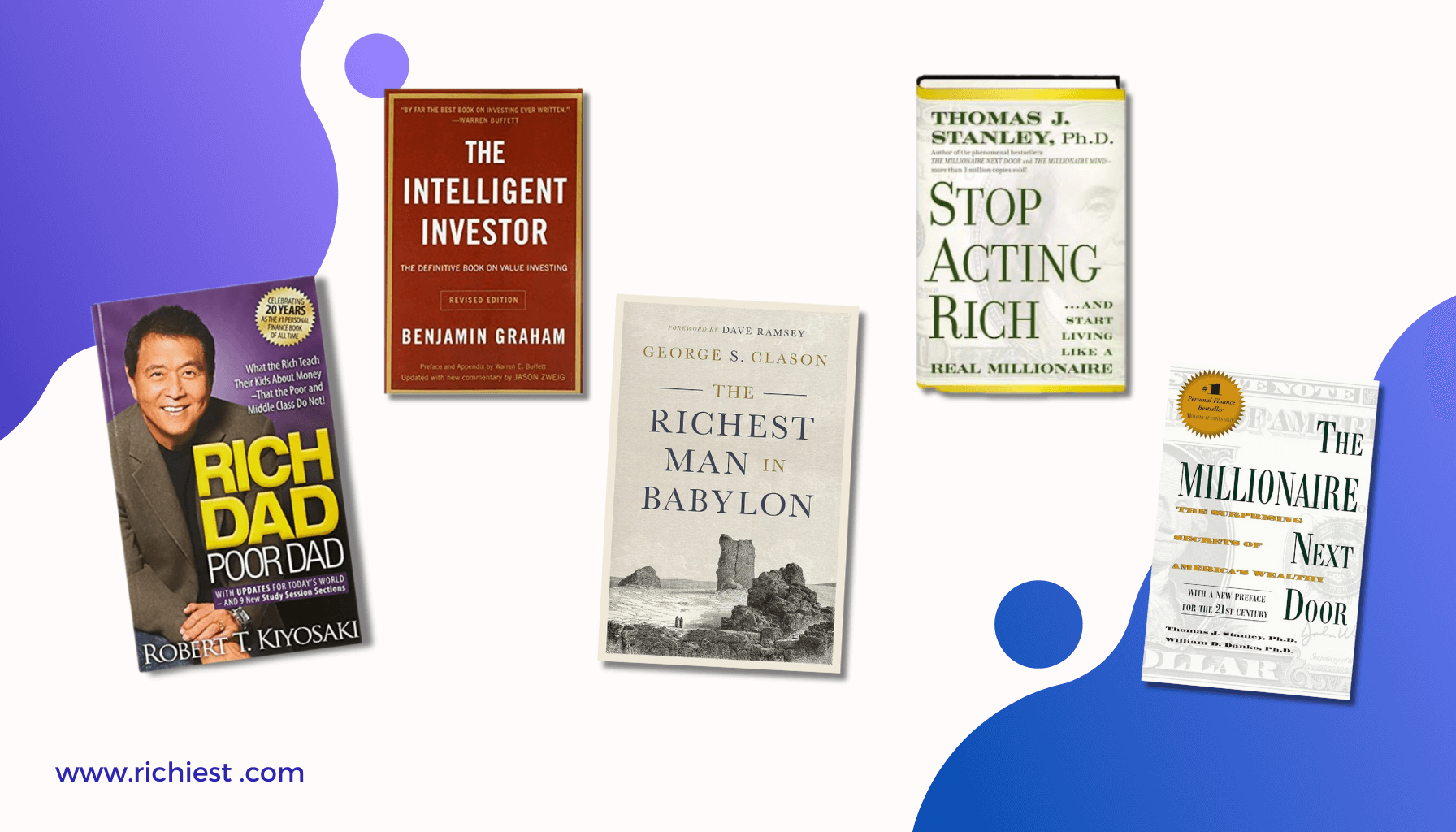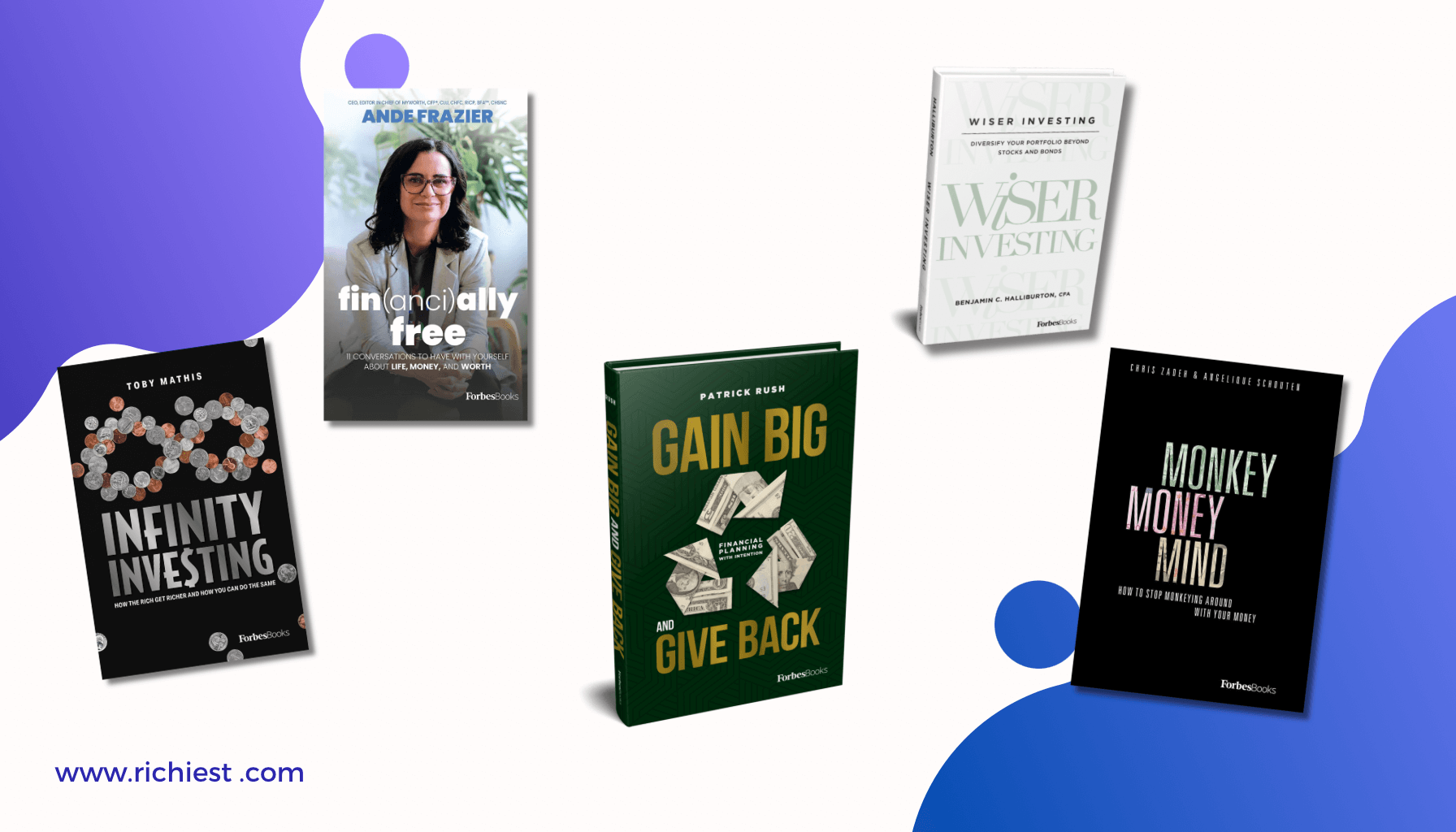Financial Literacy: Best Reads for 2024

Introduction
The year 2024 brings plenty of financial literacy books, each offering unique insights and strategies to navigate the complexities of personal finance. This article provides an expertly curated list of the top financial literacy books for 2024, essential reading for anyone looking to enhance their financial understanding and success.
We focus on books that offer practical advice, innovative strategies, and timeless wisdom in the realm of finance. Each book on this list has been chosen for its ability to provide valuable insights into managing and growing your wealth.
From classics like "Rich Dad Poor Dad" and "The Intelligent Investor" to newer entries like "The Simplest Path to Wealth" and "Your Money Or Your Life," we cover a range of topics including investment strategies, wealth building, financial planning, and the psychology of money.
In addition to our top picks, we also highlight additional noteworthy books that offer diverse perspectives and strategies. Titles like "Infinity Investing" and "Financially Free" provide fresh angles and innovative approaches to achieving financial freedom and success.
Top Financial Literacy Books [Updated 2024]
Our selection of top financial literacy books for 2024 includes both timeless classics and modern guides. Here's a detailed look at the first three books on our list:

"Rich Dad Poor Dad" by Robert T. Kiyosaki
Book Review and Key Takeaways:
Concept: This book contrasts the financial philosophies of Kiyosaki's two fathers: one rich, one poor. It challenges conventional views on money and investing.
Key Takeaways: The importance of financial education, the value of assets over liabilities, and the need to generate passive income. It emphasizes entrepreneurial thinking and challenges the traditional mindset of relying solely on a job for financial security.
"The Intelligent Investor" by Benjamin Graham
Book Review and Key Takeaways:
Concept: Often referred to as the bible of value investing, this book offers in-depth insights into the philosophy of building long-term wealth through investment.
Key Takeaways: The principles of value investing, the importance of investor psychology, and the concept of 'Mr. Market'. It advocates for a disciplined approach to investing, focusing on company fundamentals and long-term gains over short-term market fluctuations.
"The Richest Man In Babylon" by George S. Clason
Book Review and Key Takeaways:
Concept: Set in ancient Babylon, this book uses parables to impart wisdom on saving, financial planning, and wealth building.
Key Takeaways: The importance of living within means, saving a portion of income, and investing wisely. It also emphasizes the value of financial knowledge and seeking advice from experts.
"Stop Acting Rich" by Thomas J. Stanley
Book Review and Key Takeaways:
Concept: This book delves into the spending habits of the wealthy versus those who are merely trying to appear wealthy. It's a study in true wealth accumulation versus conspicuous consumption.
Key Takeaways: The importance of living below your means, investing wisely, and understanding that accumulating wealth is more about smart spending than earning high incomes. The book emphasizes the difference between being rich and acting rich.
"The Millionaire Next Door" by Thomas J. Stanley and William D. Danko
Book Review and Key Takeaways:
Concept: Based on extensive research and interviews, this book breaks down the common traits and behaviors of actual millionaires, which are often contrary to popular belief.
Key Takeaways: Most millionaires live frugally, avoid lavish spending, and prioritize saving and investing. The book highlights the effectiveness of self-discipline, financial planning, and living within one's means for accumulating wealth.

"Think And Grow Rich" by Napoleon Hill
Book Review and Key Takeaways:
Concept: A classic in the self-help genre, this book explores the psychological power of thought and the path to personal wealth. It's based on Hill's study of the habits of wealthy individuals.
Key Takeaways: The significance of personal beliefs in achieving financial success, the power of setting clear goals, and the necessity of persistence. It also discusses the role of specialized knowledge and organized planning in wealth accumulation.
"The Richest Engineer" by Abhishek Kumar
Book Review and Key Takeaways:
Concept: This book blends personal finance advice with a narrative style, focusing on an engineer's journey to financial wisdom and wealth.
Key Takeaways: It emphasizes the importance of financial planning, smart investing, and the power of compounding. The book also highlights the need for a balanced approach to life and finances, advocating for financial literacy as a key component of success.
"From The Rat Race to Financial Freedom" by Manoj Arora
Book Review and Key Takeaways:
Concept: A comprehensive guide on breaking free from the 'rat race' to achieve financial freedom. It offers a step-by-step approach to managing finances and building wealth.
Key Takeaways: The book covers various aspects of financial planning, including debt management, investment strategies, and creating passive income streams. It encourages readers to take control of their financial destiny through disciplined saving and investing.
"The Simplest Path to Wealth" by J.L. Collins
Book Review and Key Takeaways:
Concept: This book simplifies the complex world of investing, offering straightforward strategies for wealth accumulation.
Key Takeaways: It advocates for the use of index funds as a low-effort, effective investment strategy. The book also discusses the importance of financial independence and provides clear guidelines on saving, investing, and avoiding debt.
"Your Money Or Your Life" by Vicki Robin and Joe Dominguez
Book Review and Key Takeaways:
Concept: This influential book offers a holistic approach to managing money and redefining one's relationship with it. It's not just about investing or budgeting, but about transforming your financial life to align with your deepest values and life goals.
Key Takeaways:
- The book introduces the concept of "life energy" in relation to money, encouraging readers to consider the amount of life energy spent on earning money.
- It emphasizes mindful spending, saving, and investing, advocating for financial independence and a sustainable lifestyle.
- Key strategies include tracking your expenses meticulously, minimizing costs, and maximizing income, not just for wealth accumulation but for achieving a fulfilling life.
These books are carefully selected for their practical advice, relatable content, and proven strategies. They serve as essential reads for anyone looking to enhance their financial understanding and navigate the path to financial success. In the next section, we will conclude our list with the final set of recommended financial literacy books for 2024.
Additional Noteworthy Books
In addition to our top picks, there are several other books that deserve mention for their insightful contributions to financial literacy. These titles offer diverse perspectives and fresh insights into achieving financial well-being.

"Infinity Investing"
Overview and Financial Insights:
Concept: This book presents a unique approach to building wealth that transcends traditional investment strategies. It focuses on creating a sustainable and ever-growing financial portfolio.
Key Insights: The book emphasizes the importance of creating income streams that outlast your lifespan, investing in assets that appreciate over time, and the power of compound interest. It also delves into strategies for risk management and long-term financial planning.
"Financially Free"
Overview and Financial Insights:
Concept: "Financially Free" offers a roadmap to achieving financial freedom through smart money management and investment strategies. It caters to those aiming to break free from living paycheck to paycheck.
Key Insights: The book covers essential topics like budgeting effectively, eliminating debt, and making informed investment choices. It also stresses the psychological aspects of money management, encouraging a mindset shift towards wealth and abundance.
"Gain Big and Give Back"
Overview and Financial Insights:
Concept: This book combines financial growth strategies with the philosophy of giving back, highlighting how financial success can lead to greater societal contributions.
Key Insights: It explores the concept of 'conscious capitalism', where financial success is paired with ethical and philanthropic responsibilities. The book provides insights into balancing personal wealth accumulation with social impact and the fulfillment that comes from generosity.
"Monkey, Money, Mind"
Overview and Financial Insights:
Concept: This book delves into the psychological aspects of money management, exploring how our primal instincts and modern behaviors influence financial decisions.
Key Insights: It offers an intriguing look at the intersection of psychology and finance, explaining how emotional and cognitive biases can lead to poor financial choices. The book provides strategies for overcoming these biases and making more rational, informed decisions about money.
"Wiser Investing"
Overview and Financial Insights:
Concept: "Wiser Investing" is geared towards investors looking to refine their strategies and make smarter investment choices. It focuses on long-term investment principles and avoiding common pitfalls.
Key Insights: The book emphasizes the importance of diversification, understanding market cycles, and the value of patience in investing. It also discusses the role of technology in modern investing and how to use it to your advantage.
These books complete our list of top financial literacy reads for 2024. Each offers unique perspectives and practical advice, catering to a wide range of financial interests and goals. In the next section, we will conclude with final thoughts, summarizing the impact and value of these financial literacy books in personal and professional financial success.
Conclusion: The Impact and Value of Financial Literacy Books
In conclusion, the selection of financial literacy books for 2024 we've reviewed offers a wealth of knowledge, catering to a diverse range of financial goals and backgrounds. From understanding the psychological aspects of investing to mastering the art of wealth accumulation, these books provide invaluable insights for anyone.
The key to financial success lies not just in earning but in smart managing, investing, and planning. The books we've highlighted emphasize various aspects of financial literacy, from basic budgeting and saving to sophisticated investment strategies and wealth management. They serve as essential tools for anyone aiming to improve their financial situation, whether starting from scratch or looking to optimize existing financial strategies.
FAQs
1. Why Is Financial Literacy Important?
Financial literacy is crucial because it equips individuals with the knowledge necessary to make informed and effective decisions regarding their financial resources. It's essential for managing personal finances effectively, planning for the future, and understanding the broader economic world.
2. Can Reading Financial Literacy Books Really Improve My Financial Situation?
Yes, reading financial literacy books can significantly improve your financial situation. These books provide valuable insights, strategies, and practical tips on budgeting, investing, saving, and wealth building, which can help you make more informed financial decisions and develop better money management habits.
3. Are These Financial Literacy Books Suitable for Beginners?
Absolutely. Many of the books on our 2024 list are written with beginners in mind, offering clear, easy-to-understand explanations of financial concepts and practical steps to get started with personal finance management.
4. How Often Should I Read Financial Literacy Books?
The frequency of reading financial literacy books depends on your personal goals and current knowledge level. Regular reading, such as a few times a year, can help keep you updated on financial strategies and motivated to stay on track with your financial goals.
5. What Are the Key Takeaways I Should Expect from These Books?
Key takeaways include understanding the basics of personal finance, learning effective strategies for saving and investing, gaining insights into wealth accumulation, and developing a mindset conducive to financial success. Each book offers unique perspectives and actionable advice tailored to different financial objectives.